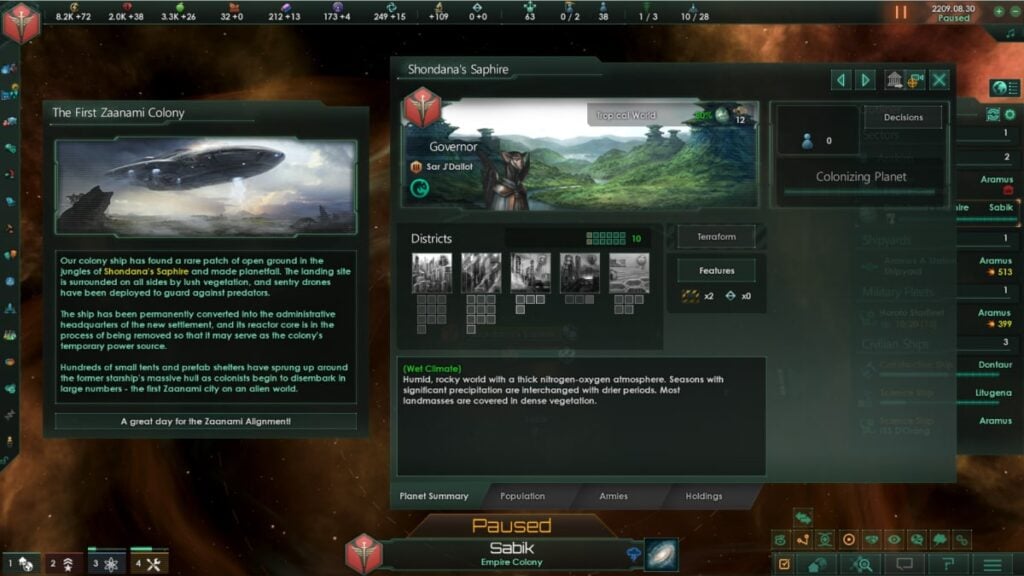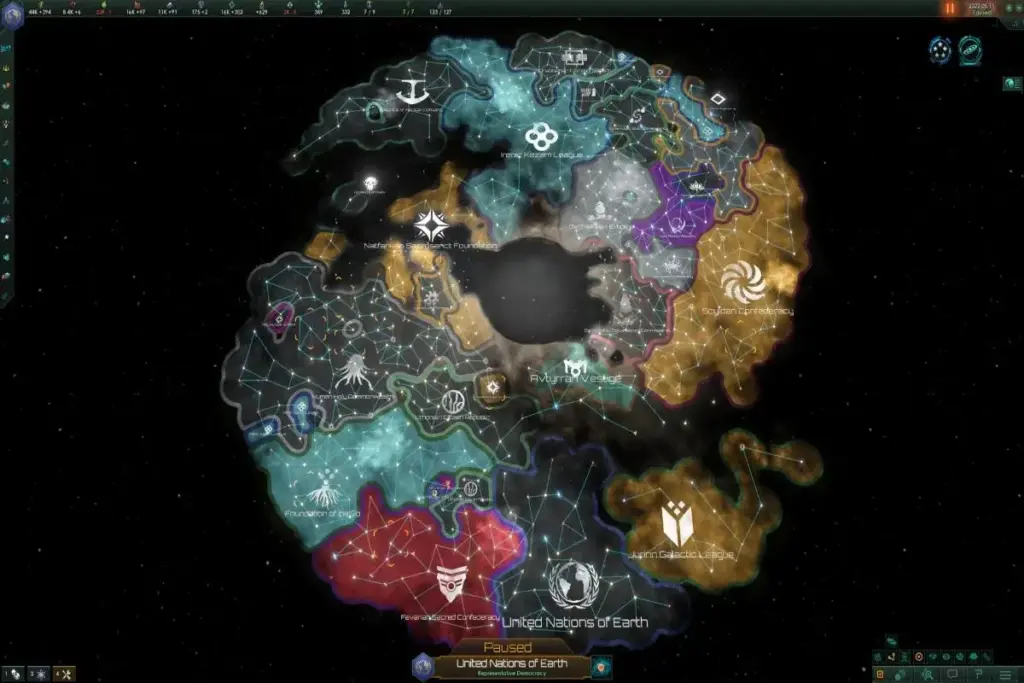There are many, many traits a new species can choose from when they take to the stars and found a galactic empire in Stellaris. These can have profound effects on the future of your colonists, as well as how they interact with other alien species. The traits you pick at the beginning will be invaluable for contending with the end crisis many years later. If you choose the advanced technology that lets you edit your species’ genetics, you can even add or remove traits mid-game! So what are the best species traits in Stellaris? Let’s find out!
Best Species Traits in Stellaris
This guide is intended for the PC version of Stellaris, but the console version is constantly getting closer and closer to the new edition, so they should work there as well.
1. Rapid Breeders

Having a very high population spread across your corner of space provides a lot of benefits. You can get more work done, grow more food, and construct more buildings or districts. Not to mention your planets become harder and harder to invade if you have a lot of people to arm the garrisons.
The easiest way to get a lot of population is if your people are rapid breeders. This can combine very well with the Adaptive trait, which allows you to settle a wider variety of planets. The Rapid Breeders trait provides a 10% bonus, which will stack with later tech advancements as well.
2. Charismatic

The Charismatic trait just means your civilization of aliens is a great time to be around, eliminating the need for employing entertainers. This frees up at least one building slot per planet, maximizing your production from various other potential buildings.
Charismatic gives you a +20% amenities generation bonus whenever those charismatic citizens are working any kind of job. Amenities determine how happy your pops are, keeping them out of crime and happy to support the interstellar government.
3. Intelligent

The Intelligent trait is one of the most important if you plan on galactic domination. It will let you stay ahead of your competition in research, providing a 10% research bonus for any of this species that stays employed in any job that provides research points, including unemployed pops in a society with the Utopian Abundance civic.
Doubling down and making a bunch of research labs for your intelligent people to work in will just make it work better. This way your stellar torpedoes and energy shields will always be just a little bit better than the enemy fleet.
4. Adaptive

Adaptive reduces the penalty for settling on worlds that are unlike your own starting planet. This means a species that’s used to a cold, arctic world can still possibly land on a more temperate one. You can settle a much wider variety of planets this way, helping you act unpredictably.
Habitability ratings determine how many resources your populations take to live and grow their populations on foreign planets. A lower rating means they’ll take more food, energy, amenities, and housing to keep them alive, while also reducing their job output.
Pairing adaptive with a medical worker building can help you get back to 100% habitability on every planet.
5. Erudite

Erudite isn’t available early on, only becoming accessible after your empire has unlocked gene-altering technology, letting you change the traits of any species under your control.
Erudite is a great replacement for the Intelligent trait, as it provides even more of a research speed bonus. It’s also important for your leaders, giving them an extra point of development and also access to a group of unique enhancements they can unlock for themselves.
An Erudite ruler for your empire will give a 5% bonus to research all around, and governors with Erudite provide a similar bonus, which overtakes the bonus that the Intelligent trait can provide.
6. Natural Engineers

Taking Natural Engineers provides a 15% bonus to all engineering research. Of the three branches of research you can take in Stellaris, engineering is the most beneficial to your military aims, while also providing early access to robot production, allowing you to considerably increase your production early on with the aid of robot workers.
This bonus applies to any research-generating job and stacks with the Intelligent or Erudite traits. In the long term, engineering is required for the majority of the megastructures you can build in the endgame. These are structures like the Dyson sphere that can have massive effects on your empire.
They are unlocked with the utopia DLC. It’s worth noting that a spiritual empire will not be as welcoming to the new robot populations, so it may be worth taking the Natural Sociologist’s trait instead.
7. Thrifty

The Thrifty trait means your pops generate extra trade value if they work in a job that generates trade, like merchants or clerks. Trade is invaluable for a lot of builds, especially later in the game when urban sprawl begins to take over your planets.
Thrifty is a great pick for a Mega-Corp, as they will have a higher percentage of jobs that can have the bonus applied to them. If you’re playing a heavily commercial game, you need to take Thrifty.
8. Strong

The Strong trait is one of the most straightforward traits you can take and is highly recommended for any warlike empire. It will make planetary invasions much easier, as your individual armies will be much more powerful than your opponent in the early game.
You will see the most benefits from the more passive bonus that Strong provides, with every worker-tier job seeing a 2.5% bonus to production. This can add up to a massive benefit when you have many, many workers spread out across the galaxy.
For even more trait points you can take Very Strong, but we would recommend waiting until mid-game with gene-altering technology to spend those points.
9. Unruly

Finally, we wanted to include our favorite negative trait, as you will likely want to take at least one negative trait in order to balance out all the positive ones you’ll need to choose from above. Unruly is one of the easiest negative traits to counter, as it will be unlikely to cause major issues until later in the game, when you’ll have the resources to deal with it or remove it from your species altogether.
Unruly makes each pop put 1.1 towards your empire size, which only starts to become an issue once it gets over 100. By the time you reach 100, you can counter the unruly pops with bureaucratic planets that simply shuffle paperwork around to keep everything in order and balance out your unity penalty, and extra research labs to counter the research penalty.
It’s a small sacrifice, necessary to get ahead in the galactic game.

Join the High Ground
Picking traits isn’t easy, especially when practically any combination of them can lead you to some form of victory. With this guide on the best species traits in Stellaris behind you, you can take the high ground all across the galaxy, in whatever form that means for you.
Happy gaming!












This really helps! Setting up an empire at the start requires a forward thinking strategy. I want incorporate a non-militaristic empire that will rely on trade, politics, or technology. Just a personal goal to keep it real!